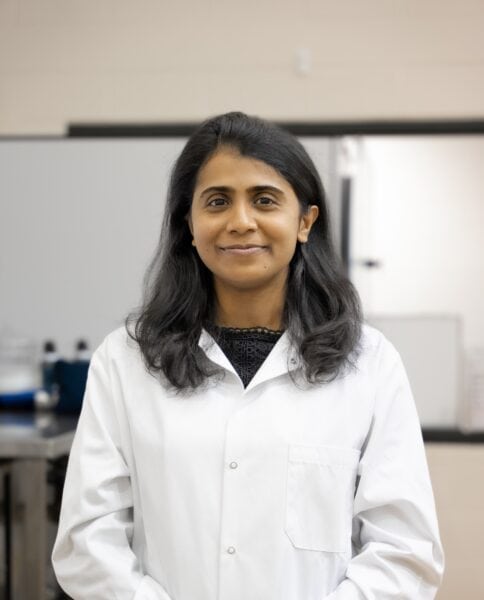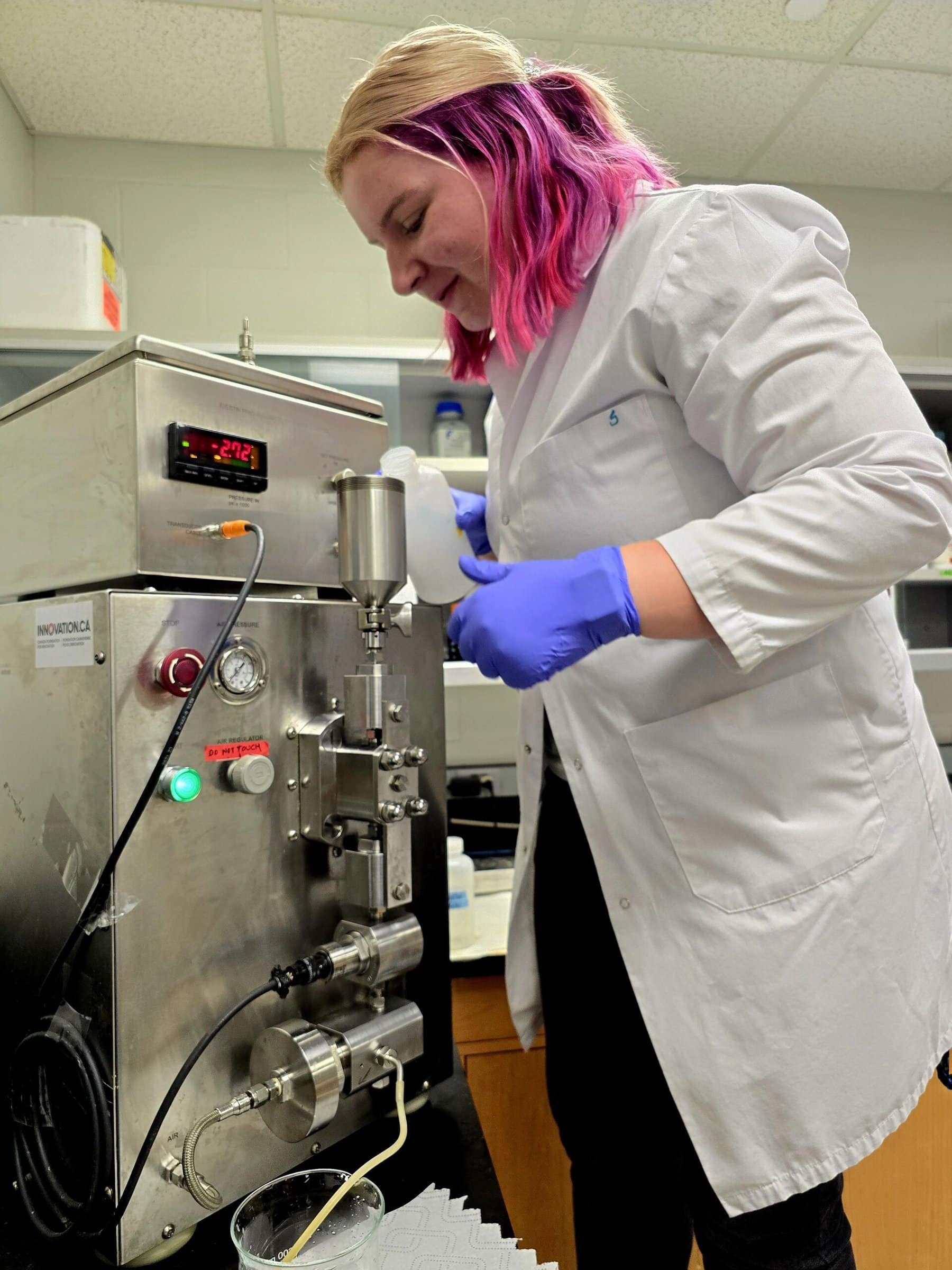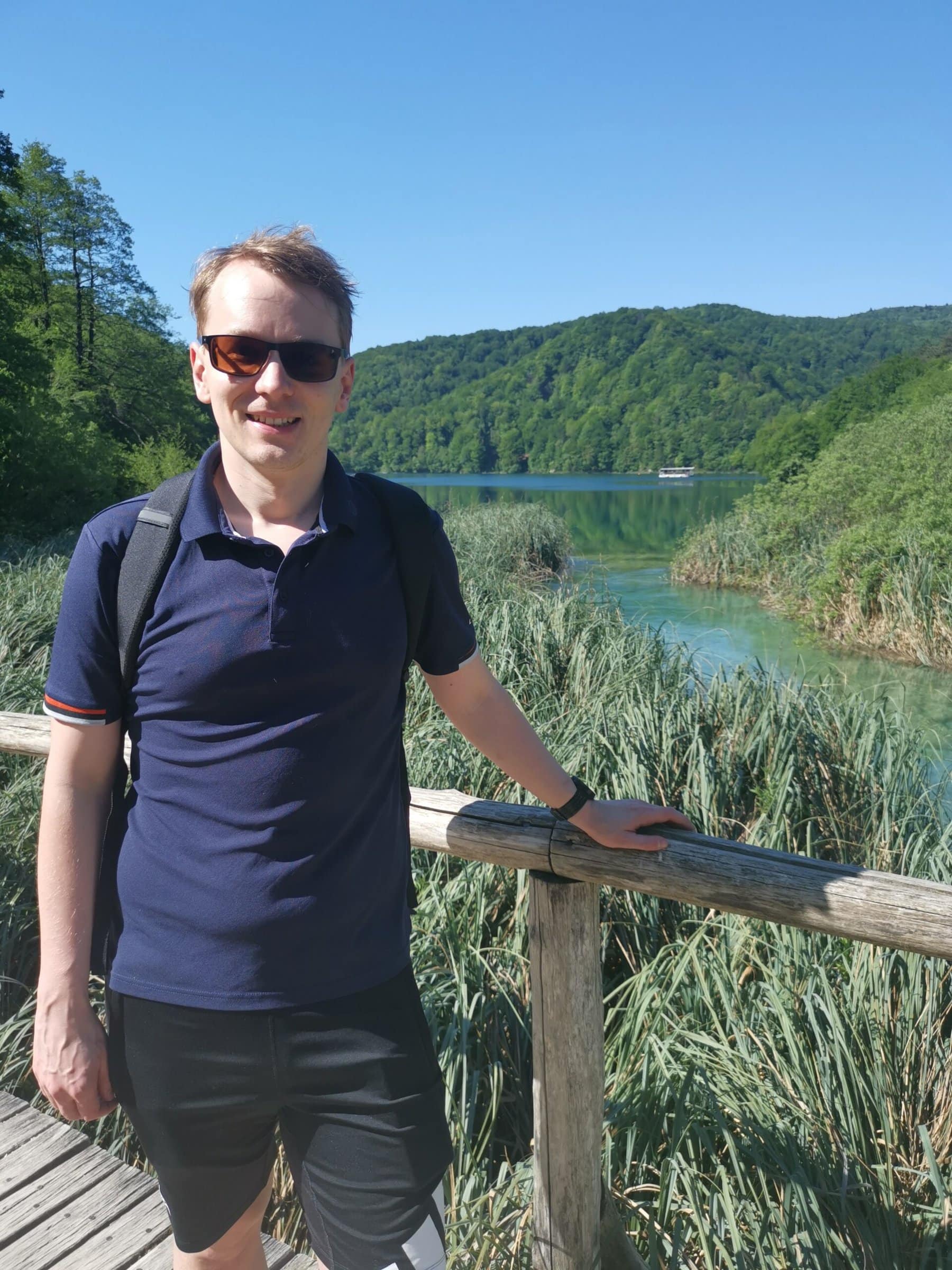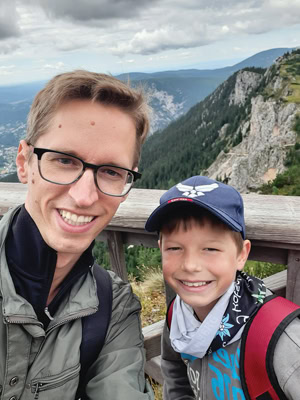
This member spotlight is about Thilini Dissanayake, a graduate student member of the Protein and Co-Products division. Thilini has been a member of AOCS since 2019 and is currently a PhD student in Dr. Nandika Bandara’s research lab at the University of Manitoba.
AOCS: What are your areas of research as a graduate student?
Thilini: In my Ph.D. research, I am developing hemp protein-based nanodelivery systems for the co-delivery of bioactive compounds. In the initial phase, I explored various extraction technologies to obtain hemp protein from cold-pressed hemp meal, and I am now working on the co-encapsulation process. In my current study, I am working to encapsulate both resveratrol and catechin simultaneously within hemp protein gels. I completed my M.Sc. in March 2022, where my MSc thesis focused on creating biodegradable food packaging materials from canola protein and modified nanocrystalline cellulose. My research work consistently emphasizes utilizing proteins from industrial byproducts to add value, and I find it exciting to explore how proteins and co-products can support a more sustainable future.
AOCS: How did you become acquainted with AOCS? In what ways have you participated in AOCS’s community?
Thilini: My journey with AOCS began in 2019 when I started my MSc at Dalhousie University, and I have been a student member ever since. Full credit goes to my supervisor, Dr. Nandika Bandara, who introduced me to AOCS and often shared his own experiences as a student member, highlighting how AOCS helped him build a professional network. His story inspired me to get involved with the AOCS Student Common Interest Group (SCIG). However, due to COVID-19, my plans to attend the annual meeting in 2020 were canceled, so I couldn’t join SCIG that year. In 2021, I presented virtually at the annual meeting and joined the AOCS SCIG. Since then, I’ve presented at AOCS annually and continued to serve on the SCIG leadership team, holding positions as vice chair, chair, and co-chair. Currently, I serve as the Student Liaison of the Proteins and Co-products (PCP) Division, connecting PCP and SCIG. I am grateful to be actively involved with AOCS and look forward to continuing my engagement in the future.
AOCS: How does AOCS currently support your professional goals?
Thilini: Joining AOCS has been one of the best decisions of my student life. AOCS has supported my professional and personal growth by providing a platform to develop valuable skills. SCIG has been instrumental in enhancing my communication and leadership abilities, allowing me to gain experience in organizing, moderating, and planning various events and activities, which helped me expand my network. AOCS has supported me in many ways; one specific example is offering students the chance to chair sessions at the annual meeting, which I consider a unique opportunity for a student. I had the privilege of serving as a session chair at the 2024 annual meeting and will also do in the 2025 annual meeting. Additionally, the leadership roles available to students within divisions, sections, and groups have been invaluable, providing more experience and motivation. My active involvement with AOCS has supported my growth beyond research presentations, fueling my overall professional development.
AOCS: How does the PCP division align with your interests and those of your research area? Have you made any connections within the division that have or can help you in your field?
Thilini: Both my MSc and PhD research focus on utilizing plant proteins from industrial by-products to add value in packaging and encapsulation applications, perfectly aligning with the PCP division’s research themes. This year (2024), I had the privilege of competing in the PCP student oral presentation competition and sharing my research findings. Over the past few years, I have had the opportunity to contribute to the division in various roles, including as a PCP newsletter volunteer and now as the student liaison between PCP and SCIG. Also, the annual meeting has been an outstanding platform to connect with fellow students in similar research areas and network with other professionals. I particularly enjoy the PCP dinner, where we celebrate each other’s achievements and build connections. I look forward to further engaging with the PCP division and helping other students find ways to connect with PCP as well. I believe the opportunity to be spotlighted in INFORM also resulted from connecting with PCP division leadership members during the annual meeting. This is just one example of how the division fosters meaningful connections and opportunities to get to know one another.
AOCS: What is the greatest benefit that you have derived from your involvement in AOCS and the PCP Division?
Thilini: The greatest benefit I’ve gained from AOCS has been the recognition I’ve received as a student, which has significantly boosted my motivation in both research and extracurricular activities. This year (2024), receiving the “AOCS Thomas H. Smouse Memorial Fellowship” marked a remarkable milestone in my student journey and I was thrilled to be chosen. I like to think of it this way; yes, AOCS awarded me the Thomas H. Smouse Memorial Fellowship, but AOCS itself played a major role in shaping me over the years to be deserving of this honor.
AOCS: Do you have any recommendations or advice for people early in their careers or students who are interested in PCP?
Thilini: I always appreciate and encourage involvement in volunteer and leadership activities. Personally, I’ve gained so much from extracurricular experiences. While research and academic work are very important, engaging in extracurricular activities adds significant value to your overall profile. It also helps you develop professional and leadership skills, which are crucial in today’s world. In many ways, participating in volunteer and leadership roles can also be a great way to relieve stress (if you have any😊).
AOCS: What is your ideal next step after you graduate?
Thilini: I have a deep passion for both research and active involvement in extracurricular and volunteer activities. I also plan to stay engaged with professional platforms like AOCS even after graduation. Given all of this, pursuing a post-doctoral fellowship feels like the ideal short-term path forward; it will allow me to engage further into in-depth research, explore new career opportunities, and continue my current commitments. So, after graduation, I will engage in post-doctoral research fellowship with the aim to establish an independent academic career for myself.
Related Posts

November 18, 2024
Member Spotlight: Meet Camrynn Simon
Camrynn Simon is a master’s student in the Food Colloids Lab at…

November 18, 2024
Member Spotlight: Meet Mikael Fabritius
Mikael Fabritius is a postdoctoral researcher in the Food Sciences unit at…

November 18, 2024
Member Spotlight: Meet Marc Pignitter
Dr. Marc Pignitter earned his doctorate in pharmaceutical sciences from the University…